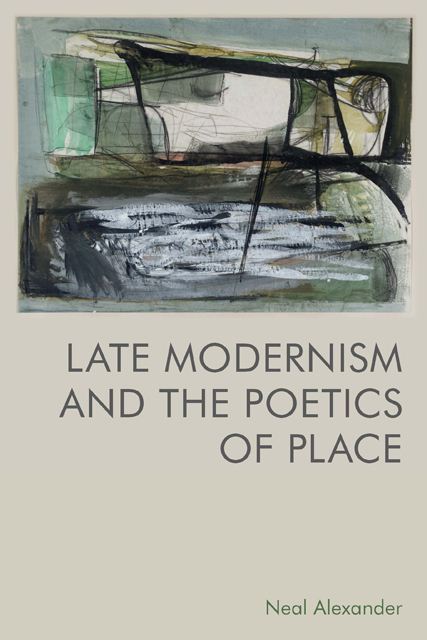Book contents
- Frontmatter
- Contents
- Acknowledgements
- Introduction
- 1 David Jones: The Sites of History
- 2 Basil Bunting’s Regional Modernism
- 3 W. S. Graham: Between Places
- 4 Lorine Niedecker: Life by Water
- 5 Charles Olson’s Mappemunde
- 6 Gwendolyn Brooks: From Bronzeville to the Warpland
- Conclusion: After Late Modernism
- Notes
- Bibliography
- Index
3 - W. S. Graham: Between Places
Published online by Cambridge University Press: 18 November 2022
- Frontmatter
- Contents
- Acknowledgements
- Introduction
- 1 David Jones: The Sites of History
- 2 Basil Bunting’s Regional Modernism
- 3 W. S. Graham: Between Places
- 4 Lorine Niedecker: Life by Water
- 5 Charles Olson’s Mappemunde
- 6 Gwendolyn Brooks: From Bronzeville to the Warpland
- Conclusion: After Late Modernism
- Notes
- Bibliography
- Index
Summary
W. S. Graham's poetics of place is closely bound up with his intense preoccupation with language, its possibilities and limitations in the event of the poem. Born and raised in the shipbuilding port town of Greenock, twenty miles west of Glasgow on the banks of the Clyde, Graham spent most of his writing life living at the other end of the archipelago, in South-west Cornwall. Across a career of nearly four decades, memories of Greenock and its hinterlands infuse many of the poems written in Cornwall, so that displacement becomes a recurrent theme of Graham's poems as well as one of its existential conditions. Moreover, a distinctive feature of his poetry is the way in which it moves imaginatively between places, collapsing spatial and temporal distances in the condensed geographies of the word. Especially in his later work, Graham finds suggestive correspondences between the landscapes, seascapes, and industrial histories of Clydeside and Cornwall, without eliding their differences and distinctive characters. His poetry also moves fluently between representations of real places that are known and familiar, and imagined or constructed spaces in which his poetry stages encounters with the unknown. These include the ice-bound landscapes of polar explorers and the equally white and silent space of the page on which his poems leave their marks. Characteristically, the kinds of places and landscapes to which his poems obsessively return are those in which land and sea, terrestrial and maritime worlds interact.
One of the most flexible spatial tropes in Graham's poetry is that of the journey or voyage, which Tony Lopez characterises as chiefly ‘a voyage of self-discovery’. For Matthew Francis, however, Graham's recurrent theme of journeying or voyaging is more persuasively understood as a figure for the ‘movement from writer to reader’ in the poem's fraught and uncertain act of communication. Graham's handling of the trope of voyaging – from land to sea, present to past, self to other, writer to reader – is supple enough to accommodate a variety of critical interpretations, and I want simply to note its importance as one manifestation of his distinctive geographical imagination. Geographical terms and concepts such as ‘place’, ‘space’, ‘journey’, ‘map’, ‘distance’, and ‘land’ are remarkably common in Graham's poetry; but because they are often closely connected to his apparently primary concerns with language and communication, the significance of material places for his work has been undervalued.
- Type
- Chapter
- Information
- Late Modernism and the Poetics of Place , pp. 81 - 110Publisher: Edinburgh University PressPrint publication year: 2022



